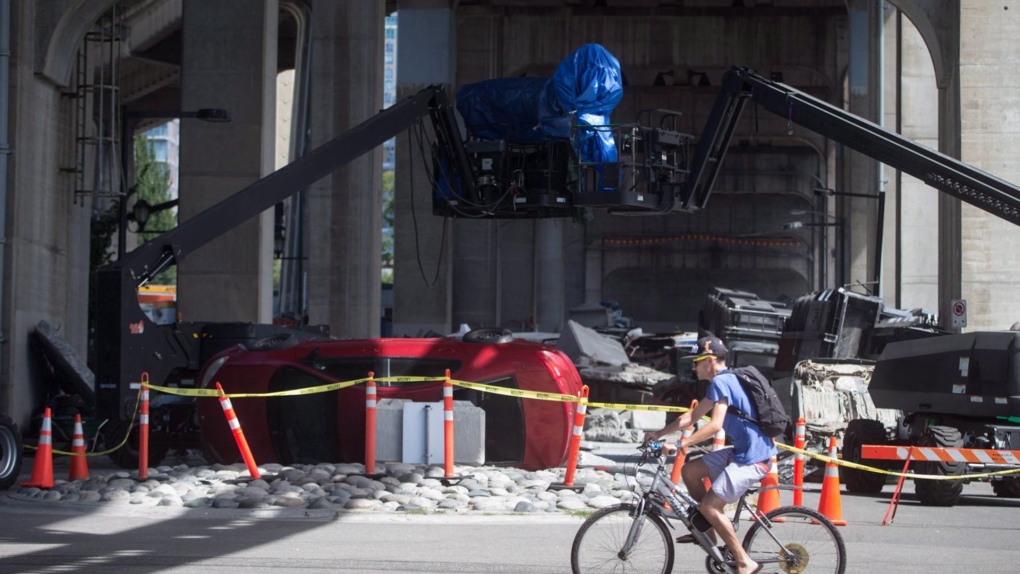Lengthy labour dispute in B.C.'s film and TV industry ends with new contract
 A cyclist rides past a film set for the movie "Deadpool 2" in Vancouver, B.C., Tuesday, Aug. 15, 2017. A 15-month dispute in British Columbia's film and television industry has ended with the ratification of a new contract for creative and logistical people working on productions shot in the province. THE CANADIAN PRESS/Darryl Dyck
A cyclist rides past a film set for the movie "Deadpool 2" in Vancouver, B.C., Tuesday, Aug. 15, 2017. A 15-month dispute in British Columbia's film and television industry has ended with the ratification of a new contract for creative and logistical people working on productions shot in the province. THE CANADIAN PRESS/Darryl Dyck
A 15-month dispute in British Columbia's film and television industry has ended with the ratification of a new contract for creative and logistical staff working on productions shot in the province.
The Directors Guild of Canada BC District Council says in a statement the new contract was supported by 89.5 per cent of the members who voted on the deal.
The guild contract is with the Alliance of Motion Picture and Television Producers and the Canadian Media Producers Association-BC.
District Council Chairman Allan Harmon issued a statement saying the ratification comes after 15 months of negotiations which included the council's first ever strike vote last April.
Kendrie Upton, B.C. council executive director, says the contract means the province's film and TV industry is open for business and a busy summer of filming ahead can begin.
Among some of the new contract details provided by the guild are: annual wage increases of three per cent retroactive to 2021, provisions for increases in B.C.'s minimum wage and recognition of National Truth and Reconciliation Day as a statutory holiday.
This report by The Canadian Press was first published June 25, 2022.
CTVNews.ca Top Stories

LIVE NOW Budget 2024 prioritizes housing while taxing highest earners, deficit projected at $39.8B
In an effort to level the playing field for young people, in the 2024 federal budget, the government is targeting Canada's highest earners with new taxes in order to help offset billions in new spending to enhance the country's housing supply and social supports.
BUDGET 2024 Feds cutting 5,000 public service jobs, looking to turn underused buildings into housing
Five thousand public service jobs will be cut over the next four years, while underused federal office buildings, Canada Post properties and the National Defence Medical Centre in Ottawa could be turned into new housing units, as the federal government looks to find billions of dollars in savings and boost the country's housing portfolio.
Some of the winners and losers in the 2024 federal budget
With a variety of fiscal and policy measures announced in the federal budget, winners include small businesses and fintech companies while losers include the tobacco industry and Canadian pension funds.
From housing initiatives to a disability benefit, how the federal budget impacts you
From plans to boost new housing stock, encourage small businesses, and increase taxes on Canada’s top-earners, CTVNews.ca has sifted through the 416-page budget to find out what will make the biggest difference to your pocketbook.
Police to announce arrests in Toronto Pearson airport gold heist
Police say that arrests have been made in connection with a $20-million gold heist at Toronto Pearson International Airport one year ago.
Teen hockey players arrested for sexual assault following hazing incident: Manitoba RCMP
Three teenagers were arrested in connection with a pair of alleged hazing incidents on a Manitoba hockey team, police say.
'I Google': Why phonebooks are becoming obsolete
Phonebooks have been in circulation since the 19th century. These days, in this high-tech digital world, if someone needs a phone number, 'I Google,' said Bridgewater, N.S. resident Wayne Desouza.
Liberals aim to hit the brakes on car theft with new criminal offences
The Liberals are proposing new charges for the use of violence while stealing a vehicle and for links to organized crime, as well as laundering money for the benefit of a criminal organization.
BUDGET 2024 Ottawa police get $50 million to boost security around Parliamentary Precinct
The Ottawa Police Service will receive $50 million in new federal funding over the next five years to "enhance security" around the Parliamentary Precinct.































